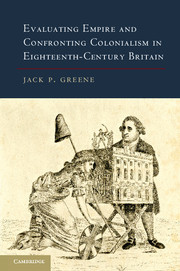Description
Evaluating Empire and Confronting Colonialism in Eighteenth-Century Britain
Author: Greene Jack P.
This book analyzes how Britons celebrated and critiqued their empire during the short eighteenth century, from about 1730 to 1790.
Language: English
Subject for Evaluating Empire and Confronting Colonialism in...:
Approximative price 85.25 €
In Print (Delivery period: 14 days).
Add to cart
Evaluating Empire and Confronting Colonialism in Eighteenth-Century Britain
Publication date: 03-2013
Support: Print on demand
Publication date: 03-2013
Support: Print on demand
Approximative price 34.17 €
In Print (Delivery period: 14 days).
Add to cart
Evaluating Empire and Confronting Colonialism in Eighteenth-Century Britain
Publication date: 03-2013
404 p. · 15.3x23.5 cm · Paperback
Publication date: 03-2013
404 p. · 15.3x23.5 cm · Paperback
Description
/li>Contents
/li>Biography
/li>
This volume comprehensively examines how metropolitan Britons spoke and wrote about the British Empire during the short eighteenth century, from about 1730 to 1790. The work argues that following several decades of largely uncritical celebration of the empire as a vibrant commercial entity that had made Britain prosperous and powerful, a growing familiarity with the character of overseas territories and their inhabitants during and after the Seven Years' War produced a substantial critique of empire. This critique evolved out of a widespread revulsion against the behaviours exhibited by Britons overseas and built on a language of 'otherness' that metropolitans had used since the beginning of overseas expansion to describe its participants, the societies and polities that Britons abroad constructed in their new habitats. It used the languages of humanity and justice as standards to evaluate and condemn the behaviours of both overseas Britons and subaltern people in the British Empire, whether in India, the Americas, Africa or Ireland.
1. 'The principal cornucopia of Great Britain's wealth': the languages of commerce, liberty, security, and maritime supremacy and the celebration of empire; 2. Outposts of 'loose vagrant people': the language of alterity in the evaluation of empire; 3. 'A fabric at once the dread and wonder of the world': the languages of imperial grandeur, liberty, commerce, humanity, and justice and the American challenge to empire; 4. Arenas of 'Asiatic plunder': the languages of humanity and justice and the excesses of empire in India; 5. Sites of Creolean despotism: the languages of humanity and justice and the critique of colonial slavery and the African slave trade; 6. 'A fruitless, bloody, wasting war': the languages of imperial grandeur. Liberty, humanity, and commerce in the American conflict; 7. 'This voraginous gulph of Hibernian dependence': the languages of oppression, corruption, justice, liberty, and humanity and the identification of imperial excesses in Ireland; 8. A 'shadow of our former glory'?: The discussion of empire in the wake of American secession; 9. Epilogue: 'against every principle of justice, humanity, and whatever is allowed to be right among mankind': standards of humanity and the evaluation of empire.
Jack P. Greene is the Andrew W. Mellon Professor Emeritus in the Humanities in the Department of History at The Johns Hopkins University. Before retiring in 2005, he taught colonial British-American history for almost a half century at Michigan State University, Western Reserve University, the University of Michigan and The Johns Hopkins University. Greene's publications are extensive, including eleven monographs, seven booklets, eight edited volumes, eight documentary editions, two anthologies, four encyclopedias and one bibliography. He has also published nearly one hundred chapters in books, more than one hundred journal articles and hundreds of book reviews. Additionally, he has supervised eighty-eight dissertations. Greene is a member of the American Historical Association, the American Philosophical Society, the American Academy of Arts and Sciences, the Royal Historical Society and the British Academy.
© 2024 LAVOISIER S.A.S.




